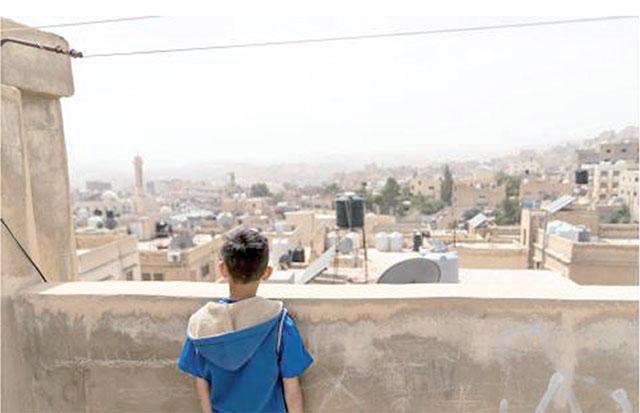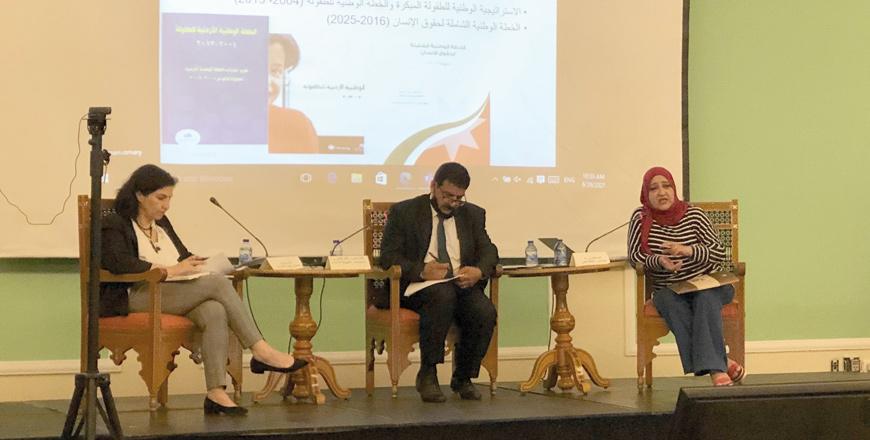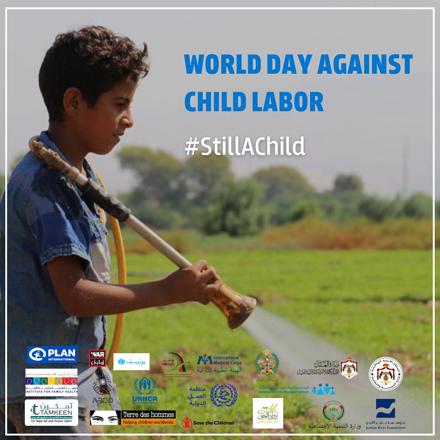You are here
Conference on child protection in Jordan stresses need for united action
By Maria Weldali - Oct 04,2021 - Last updated at Oct 04,2021

The National Conference on Child Protection in Jordan, ‘We Have Hope’, highlighted the importance of cohesive action from various institutions on child protection, supporting local humanitarian work (Photo courtesy of UNICEF Jordan website)
AMMAN — The National Conference on Child Protection in Jordan, “We Have Hope”, highlighted the importance of cohesive action from various institutions on child protection, supporting local humanitarian work.
Organised by the Arab Renaissance for Democracy and Development (ARDD) together with the United Nations Office for the Coordination of Humanitarian Affairs (OCHA), the conference was held as part of the “Enhancement of the Protective Environment of Jordanian and Syrian Children” project, focusing on two key themes.
The first topic delved into the governance structure and the latest legislation and legal advancements regarding child protection, while the second shed light on the protection mechanisms of children’s psychological, social and financial assistance services.
“The project is based upon complementary and intersectional services,” ARDD CEO Samar Muhareb said during the conference on Monday. He added that the project, which was implemented by ARDD, OCHA, and other local organisations, sought to combine cash assistance with legal aid and requirements.
Highlighting the importance of integration in order to provide the best outcomes with limited resources, Muhareb noted that “there has to be innovative methods of providing services that suit the local context”.
The project has reached 1,500 beneficiaries according to Muhareb. He noted that JD200 of financial aid has been extended to each underprivileged family with children, alongside providing legal assistance.
“Dialogue must continue. Lessons learned must be gathered and codified in order not to go backwards,” Muhareb added.
During the conference’s first session that shed light on the latest legislative and judicial developments in the child protection sector, National Council for Family Affairs Secretary General Mohammad Miqdadi talked about family and child protection systems in Jordan. These systems were established at the founding of Family Protection Department, known today as Family Protection and Juvenile Department.
“A range of successes have been achieved in Jordan thanks to the work and development concerning its legislations, policies, measures and provision of services” Miqdadi said. He noted that Jordan has the resources and national methodology necessary for upgrading service providers’ capacities.
This unprecedented crisis has emphasised the need to tackle the root cause of issues that affect children’s rights in Jordan, such as poverty, drugs, bullying and lack of healthcare, according to Miqdadi. He added that the need to sustain children’s right to education is of great importance.
Discussing the merge of the family and juvenile protection departments, Head of the Family Protection and Juvenile Department Firas Al Rasheed said: “The department has worked on developing its response and reporting tools during the ongoing pandemic.”
Rasheed also underlined the need to move away from conventional protection mechanisms. He reflected on major legal issues facing children in Jordan such as child marriage, as well as children’s lack of documentation.
Executive Director of Tamkeen for Legal Aid and Human Rights Linda Al Kalash discussed the issues of child begging, child labour and human trafficking. She said: “During the lockdown period imposed by COVID-19, child labour rates have increased, due to the economic situation in the Kingdom.”
“Jordan needs further strategies to combat these problems and we need to ensure that they are implemented,” she added.
Mofeda Al Zawahrah, president of the Jordanian Juvenile and Orphans Welfare Association, talked about the main challenges facing institutions dealing with the protection of children in Mafraq Governorate are most notably financial challenges.
UNICEF’s Chief Child Protection Mariyampillai Mariyaselvam said: “The holistic approach of child protection would be through having a national child protection system that would include all protection policies and structures assembled together to address negative practices against children and provide adequate services.”
Mariyaselvam also discussed during the second session the need to involve the whole community when addressing negative social norms, which contribute to violence against children.
She added that UNICEF works with the government of Jordan, taking into account three main pillars: Improving the quality of social services, working with communities to enact change and aligning local legislation more closely with international standards.
Farah Samawi, director of the Outreach and Business Development section at Al Amal Project which “uses innovative approaches in addressing the impacts of trauma on children”, said that they provide the mechanisms, skills and tools needed to help children.
Related Articles
DEAD SEA — The National Council for Family Affairs (NCFA) kicked off a two-day workshop on Saturday in collaboration with UNICEF to mobilise
AMMAN — The National Council for Family Affairs (NCF) and UNICEF on Wednesday organised a consultative meeting over the 2023 action plan on
AMMAN — Child Labour Task Forces that include ministries, governmental entities, organisations and associations on Sunday launched a s


















